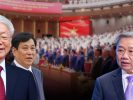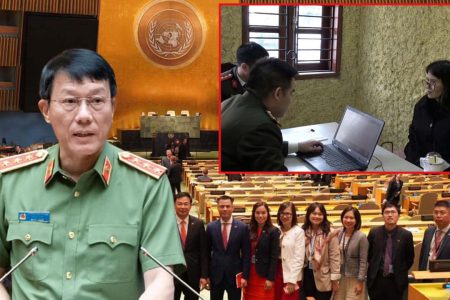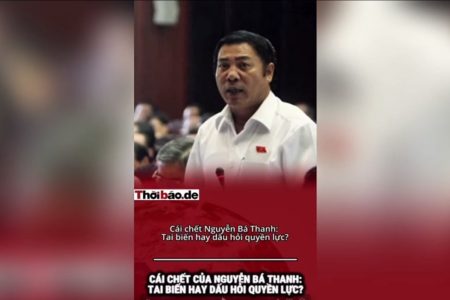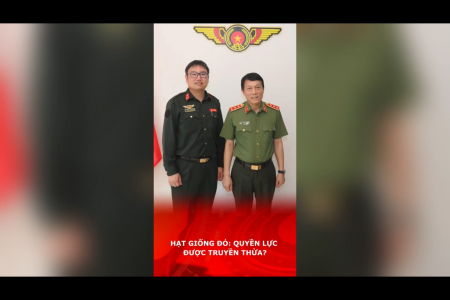Is China trying to implement an old scenario to extend the occupation of Whitsun Reef in the Truong Sa (Spratlys) in the East Sea (South China Sea)?
The fact that China allows many Chinese fishing vessels, which Vietnamese media, as well as Philippine officials, call „marine militia,“ to dock for a long time at Whitsun Reef considered a dangerous step for Vietnamese sovereignty.
Responding to China’s moves, the Philippines responded quickly and strongly, widely discussed by the international media. Meanwhile, the Vietnamese government seems to be quieter.
Experts say that Vietnam needs to be more proactive and open to its reactions.
Chinese schemes
Talking to BBC News in Vietnamese, expert Nguyen The Phuong from the Dai Su Ky East Sea Project – an independent research project in Vietnam evaluated:
„If we turn to the events in history, such as China’s forcible capture of the Hoang Sa (Paracels) in 1974 or the massacre of Gac Ma (Johnson South Reef) in 1988, it must be based on factors of opportunity during the war or the process of enhancing China-the US relationship.“
„As for the Gac Ma massacre in 1988, Vietnam at that time had great difficulties both internally and externally. The Renewal Policy had been implemented for 2 years and its effects were still limited, and the economy and society crisis had not been resolved. Vietnam was facing an embargo, enormous pressure from all countries related to Cambodia (China, the US, the West, Southeast Asian countries) makes Vietnam’s resources in defense security limited.“
„Besides, relations with the Soviet Union as a nominal treaty ally, but the Soviet Union itself was in crisis and Moscow was also in the process of adjusting relations with the US (and China), which resulted in the very limited real-world help of the Soviet Union,“ analyzed The Phuong expert.
Mr. Phuong said that the loss of Gac Ma in 1988 was a lesson that Vietnam always repeats when it comes to current policy choices, greatly influencing the formation of Vietnam’s „rebalance“ thinking in present.
There are concerns that China is waiting for a similar opportunity to further control the entities in Spratlys. China’s ambitions in the archipelago, he said, are much larger than just the seven entities they have occupied and expanded as of today.
On April 6, China International Radio quoted Foreign Ministry spokesman Zhao Lijian saying that „Whitsun Reef and surrounding seas are always an important working place and a place to avoid the wind of Chinese fishing ships so Chinese fishing vessels operating and avoiding the wind it is reasonable and legal.“
Although China has always said that its fishing vessels are only docked to avoid the wind, Vietnamese media and Philippine officials say these are „marine militia“ ships and that the fact that the vessels have been docked for many days with the intention to increase China’s presence area, gradually moving towards occupation in reality. The Philippine authorities repeatedly voiced their protests and sent vehicles to this area. Vietnam’s Ministry of Foreign Affairs also formally objected.
„China’s concentration of fishing vessels in Whitsun Reef, and then Kennan demonstrates its ability to actually deploy forces, and in this way, it shows China’s ability to control in reality,“ assessed by expert Nguyen The Phuong. According to Mr. Phuong, the Union Banks cluster is the disputed space between Vietnam, the Philippines, and China in which Vietnam has 4 island points and China occupies 2. However, China is the party with the greatest advantage.
„Regardless of whether the fishing vessels anchored in Union Banks clusters are marine militia or purely civilian, China’s overwhelming presence is indisputable,“ Phuong said.
In terms of strategy, for China, the idea is to control the entire Spratlys. The Union Banks Cluster is a point where they have not fully 100% control. If in the case that China turns Whitsun Reef into a strong base, with an airport or a harbor, firstly, it will help China to 100% control Union Bank cluster in the North-South direction, due to the fact that all ships wishing to enter this cluster had to pass through a small channel southwest of Whitsun Reef.

The second is to create the next major logistical base outside of Gac Ma so that China can deploy forces around, replenish resources for Tu Nghia (Hugh Reef), and serve as a support point for Mischief Reef. Third, when there is a conflict, China can faster neutralize the clusters of Vietnamese bases around, especially Sinh Ton Dong (Grierson Reef).
However, Mr. Phuong assessed that the possibility of China building an artificial island in Whitsun Reef is currently not high, because this will increase unnecessary tension, sometimes crossing the line red of Vietnam.
„The highest possibility is still increased presence and actual control, as China has done in Scarborough. This is a constant risk,“ said expert Nguyen The Phuong.
However, Mr. Phuong said that any scenario cannot be ruled out and needs to continue to monitor the next moves in the future.
„Whatever the reason, random or not, the position of Whitsun Reef is clearly important,“ he said.
Vietnam is “at a disadvantage” in terms of media
In the tense story at Whitsun Reef, the Philippines is the country that speaks early, vigorously, continuously, and has the most positive moves, such as sending ships and aircraft for dynamic surveillance. The country also announced that it would issue a note to protest every day until the Chinese ships withdrew.
The Philippines‘ response caught the attention of the US. In a phone call with Philippine Foreign Minister Teodoro Locsin last week, US Secretary of State Antony Blinken stressed that the mutual defense treaty between Washington and Manila could apply to the South China Sea issue. At the same time, the USS Theodore Roosevelt carrier fleet arrived in the South China Sea.
Meanwhile, despite being considered a country with a strong legal basis for the sovereignty of Whitsun Reef, Vietnam reacted slowly and not as furiously as the Philippines. It happened from the beginning of March, but after many days the Ministry of Foreign Affairs of Vietnam spoke up, much behind the Philippines.
The Philippines has always widely communicated the activities of ships and aircraft in Whitsun Reef to put pressure on China and alarmed international public opinion, and Vietnam was quiet in field activities in the case.
It was not until March 25 that Vietnamese Foreign Ministry’s Spokeswoman Le Thi Thu Hang confirmed that the Chinese fishing vessels in Whitsun have violated Vietnam’s sovereignty, violating the 1982 UNCLOS regulations on the operation of the foreign boats in the coastal national territorial waters and contrary to the Declaration on the Conduct of Parties in the South China Sea (DOC).
On April 8, Ms. Le Thi Thu Hang said: „Vietnamese authorities always closely monitor developments in the South China Sea, protect and enforce sovereignty and sovereignty overseas, in accordance with the international law, including UNCLOS 1982.“
„The delay in Vietnam’s speech is detrimental, at least in terms of the media, when the media and international scholars mention this issue based on information and images given by the Philippines. This unintentionally undermines Vietnam’s efforts to assert sovereignty in Union Banks cluster in general and Whitsun Reef in particular,“ said expert Nguyen The Phuong.
According to Mr. Phuong, up to now, the Vietnamese navy and coast guards are still active in disputed maritime areas. This is something that Vietnam still does regularly.
„However, there are two things to note here. The first is that the asymmetric force correlation makes the majority of Vietnam’s measures still more reactive than proactive. Second, Vietnam is not regularly publicizing activities to protect its sovereignty in Spratlys in particular and the South China Sea in general. In some cases, this is detrimental to the media,“ Mr. Phuong said.
The Dai Ky Su Bien Dong Project expert also said that the Vietnamese government needs to be more proactive in-field capture, forecasting, reconnaissance, and control work, and ultimately media, especially with international partners. This is more beneficial than harmful.
„The lesson of China building up artificial islands in Spratlys that no one can predict and stop is a big one,“ Phuong warned.
Thoibao.de (Translated)


























